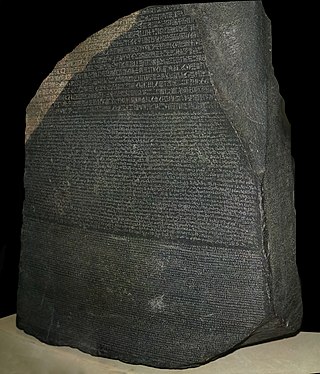
The Rosetta Stone is a stele of granodiorite inscribed with three versions of a decree issued in 196 BC during the Ptolemaic dynasty of Egypt, on behalf of King Ptolemy V Epiphanes. The top and middle texts are in Ancient Egyptian using hieroglyphic and Demotic scripts, respectively, while the bottom is in Ancient Greek. The decree has only minor differences across the three versions, making the Rosetta Stone key to deciphering the Egyptian scripts.

The Rosetta Project is a global collaboration of language specialists and native speakers working to develop a contemporary version of the historic Rosetta Stone. Run by the Long Now Foundation, the project aims to create a survey and near-permanent archive of 1,500 languages that can enable comparative linguistic research and education and might help recover or revitalize lost languages in the future.
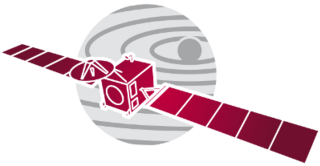
Rosetta was a space probe built by the European Space Agency launched on 2 March 2004. Along with Philae, its lander module, Rosetta performed a detailed study of comet 67P/Churyumov–Gerasimenko (67P). During its journey to the comet, the spacecraft performed flybys of Earth, Mars, and the asteroids 21 Lutetia and 2867 Šteins. It was launched as the third cornerstone mission of the ESA's Horizon 2000 programme, after SOHO / Cluster and XMM-Newton.
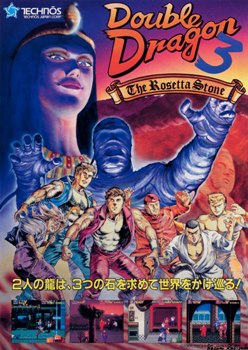
Double Dragon 3: The Rosetta Stone is a side-scrolling beat 'em up arcade game produced by Technōs Japan in 1990. It is the third arcade game in the Double Dragon series. Unlike the previous two games in the series, Double Dragon 3 was not developed internally at Technōs, but development was instead contracted to the company East Technology, resulting in a game that looks and plays differently from its predecessors.

Brain Age: Train Your Brain in Minutes a Day!, known as Dr. Kawashima's Brain Training: How Old Is Your Brain? in the PAL regions, is an edutainment puzzle video game. It was developed and published by Nintendo for the Nintendo DS. Nintendo has stated that it is an entertainment product inspired by Tohoku University professor Ryuta Kawashima's work in the neurosciences.

Rosetta is a dynamic binary translator developed by Apple Inc. for macOS, an application compatibility layer between different instruction set architectures. It enables a transition to newer hardware, by automatically translating software. The name is a reference to the Rosetta Stone, the artifact which enabled translation of Egyptian hieroglyphs.

Rosetta Stone Language Learning is proprietary, computer-assisted language learning (CALL) software published by Rosetta Stone Inc, part of the IXL Learning family of products. The software uses images, text, and sound to teach words and grammar by spaced repetition, without translation. Rosetta Stone calls its approach Dynamic Immersion.
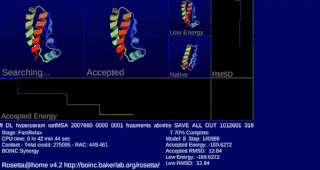
Rosetta@home is a volunteer computing project researching protein structure prediction on the Berkeley Open Infrastructure for Network Computing (BOINC) platform, run by the Baker lab. Rosetta@home aims to predict protein–protein docking and design new proteins with the help of about fifty-five thousand active volunteered computers processing at over 487,946 GigaFLOPS on average as of September 19, 2020. Foldit, a Rosetta@home videogame, aims to reach these goals with a crowdsourcing approach. Though much of the project is oriented toward basic research to improve the accuracy and robustness of proteomics methods, Rosetta@home also does applied research on malaria, Alzheimer's disease, and other pathologies.

Brain Age 2: More Training in Minutes a Day!, known as More Brain Training from Dr Kawashima: How Old Is Your Brain? in PAL regions, is an edutainment puzzle game and the sequel to Brain Age: Train Your Brain in Minutes a Day! (2005). It was developed and published by Nintendo for the Nintendo DS handheld game console. Before the game begins, the player must perform a Brain Age Check to determine their brain age, which ranges from 20 to 80, to determine approximately their brain's responsiveness. A brain age of 20, the lowest age that the player can achieve, indicates that the player's brain is as responsive as that of an average 20-year-old. After the player is told their initial brain age, they can complete a series of minigames to help improve their brain's responsiveness, after which they can run Brain Age Check again to determine their updated brain age.

Brain training is a program of regular activities purported to maintain or improve one's cognitive abilities. The phrase “cognitive ability” usually refers to components of fluid intelligence such as executive function and working memory. Cognitive training reflects a hypothesis that cognitive abilities can be maintained or improved by exercising the brain, analogous to the way physical fitness is improved by exercising the body. Cognitive training activities can take place in numerous modalities such as cardiovascular fitness training, playing online games or completing cognitive tasks in alignment with a training regimen, playing video games that require visuospatial reasoning, and engaging in novel activities such as dance, art, and music.

David Baker is an American biochemist and computational biologist who has pioneered methods to design proteins and predict their three-dimensional structures. He is the Henrietta and Aubrey Davis Endowed Professor in Biochemistry, an investigator with the Howard Hughes Medical Institute, and an adjunct professor of genome sciences, bioengineering, chemical engineering, computer science, and physics at the University of Washington. He was awarded the shared 2024 Nobel Prize in Chemistry for his work on computational protein design.

Flash Focus: Vision Training in Minutes a Day is a Touch! Generations puzzle video game developed by Namco Bandai and Nintendo SPD and published by Nintendo for the Nintendo DS handheld video game console. It was released in Japan on May 31, 2007 as Miru Chikara wo Jissen de Kitaeru: DS Medikara Training and released in North America on October 15.
Rosetta Genomics Ltd. was a molecular diagnostics company with offices in Israel and the United States that uses micro-ribonucleic acid (microRNA) biomarkers to develop diagnostic tests designed to differentiate between various types of cancer. The company expects the first three tests based on its technology to be submitted for regulatory approval in 2008. The diagnostic tests will differentiate between squamous and non-squamous non-small cell lung cancer (NSCLC); differentiate between adenocarcinoma and peritoneal mesothelioma; and seek to identify the origin of tumors in patients representing cancer of unknown primary (CUP). Using a single microRNA, the highly sensitive, highly specific test for squamous and non-squamous lung cancer has passed the prevalidation phase and has been submitted for approval to the New York State Department of Health Clinical Laboratory Evaluation Program in April 2008.

Foldit is an online puzzle video game about protein folding. It is part of an experimental research project developed by the University of Washington, Center for Game Science, in collaboration with the UW Department of Biochemistry. The objective of Foldit is to fold the structures of selected proteins as perfectly as possible, using tools provided in the game. The highest scoring solutions are analyzed by researchers, who determine whether or not there is a native structural configuration that can be applied to relevant proteins in the real world. Scientists can then use these solutions to target and eradicate diseases and create biological innovations. A 2010 paper in the science journal Nature credited Foldit's 57,000 players with providing useful results that matched or outperformed algorithmically computed solutions.

Rosetta Stone Inc. is an American education technology software company that develops language, literacy and brain-fitness software. Best known for its language-learning products, in 2013, the company expanded beyond language into education-technology with its acquisitions of Livemocha, Lexia Learning, Fit Brains, and Tell Me More. In 2021, it became a subsidiary of IXL Learning.

Global Mechanic Media is an interdisciplinary creative studio headquartered in Vancouver, British Columbia, Canada. It is known for creating various digital and traditional media, feature and short films, television series, commercials, games, installations, interactive experiences, titles, and original photography using many different techniques. Global Mechanic was founded in 2000 by Creative Director, Bruce Alcock and is currently owned with his wife, CEO Tina Ouellette. Specialties include animation, branding and design.
Max Sigmund Cynader CM, OBC, Ph.D, FRSC, FCAHS is a Canadian neuroscientist. He is the founding director of the Brain Research Centre and the Djavad Mowafaghian Centre for Brain Health at the University of British Columbia.

Jeffrey Adgate "Jeff" Dean is an American computer scientist and software engineer. Since 2018, he has been the lead of Google AI. He was appointed Google's chief scientist in 2023 after the merger of DeepMind and Google Brain into Google DeepMind.
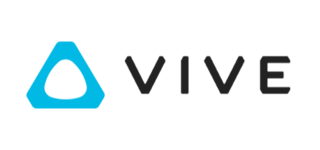
HTC Vive is a line of virtual and mixed reality headsets produced by HTC Corporation. The brand currently encompasses headsets designed for use with personal computers as well as standalone headsets such as the Vive Focus line, Vive Flow glasses, and the Vive Elite XR mixed reality headset.
Jessica Eugenie Huber is an American speech scientist. She is a Professor of speech, language and hearing sciences and College of Health and Human Sciences associate dean for research at Purdue University.
















